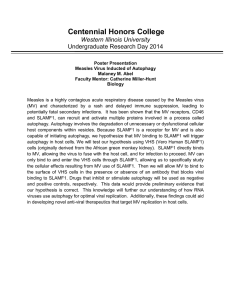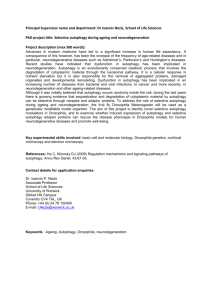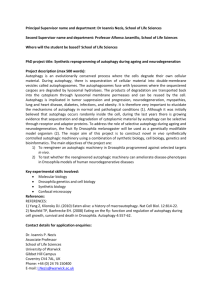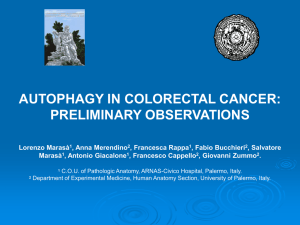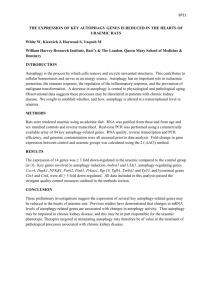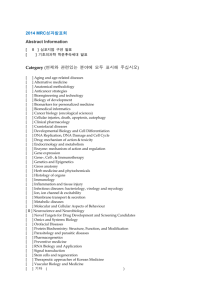Principal Supervisor: Dr Ioannis Nezis, School of Life Sciences PhD
advertisement
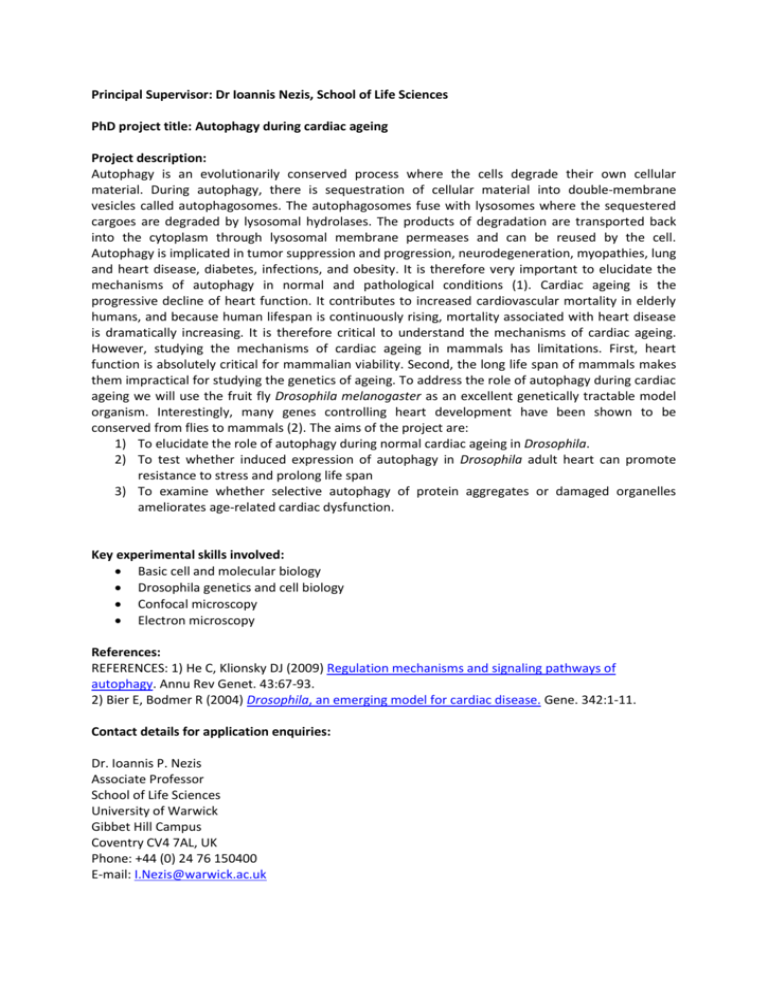
Principal Supervisor: Dr Ioannis Nezis, School of Life Sciences PhD project title: Autophagy during cardiac ageing Project description: Autophagy is an evolutionarily conserved process where the cells degrade their own cellular material. During autophagy, there is sequestration of cellular material into double-membrane vesicles called autophagosomes. The autophagosomes fuse with lysosomes where the sequestered cargoes are degraded by lysosomal hydrolases. The products of degradation are transported back into the cytoplasm through lysosomal membrane permeases and can be reused by the cell. Autophagy is implicated in tumor suppression and progression, neurodegeneration, myopathies, lung and heart disease, diabetes, infections, and obesity. It is therefore very important to elucidate the mechanisms of autophagy in normal and pathological conditions (1). Cardiac ageing is the progressive decline of heart function. It contributes to increased cardiovascular mortality in elderly humans, and because human lifespan is continuously rising, mortality associated with heart disease is dramatically increasing. It is therefore critical to understand the mechanisms of cardiac ageing. However, studying the mechanisms of cardiac ageing in mammals has limitations. First, heart function is absolutely critical for mammalian viability. Second, the long life span of mammals makes them impractical for studying the genetics of ageing. To address the role of autophagy during cardiac ageing we will use the fruit fly Drosophila melanogaster as an excellent genetically tractable model organism. Interestingly, many genes controlling heart development have been shown to be conserved from flies to mammals (2). The aims of the project are: 1) To elucidate the role of autophagy during normal cardiac ageing in Drosophila. 2) To test whether induced expression of autophagy in Drosophila adult heart can promote resistance to stress and prolong life span 3) To examine whether selective autophagy of protein aggregates or damaged organelles ameliorates age-related cardiac dysfunction. Key experimental skills involved: Basic cell and molecular biology Drosophila genetics and cell biology Confocal microscopy Electron microscopy References: REFERENCES: 1) He C, Klionsky DJ (2009) Regulation mechanisms and signaling pathways of autophagy. Annu Rev Genet. 43:67-93. 2) Bier E, Bodmer R (2004) Drosophila, an emerging model for cardiac disease. Gene. 342:1-11. Contact details for application enquiries: Dr. Ioannis P. Nezis Associate Professor School of Life Sciences University of Warwick Gibbet Hill Campus Coventry CV4 7AL, UK Phone: +44 (0) 24 76 150400 E-mail: I.Nezis@warwick.ac.uk BBSRC Remit area: Molecular systems biology (including Gene expression, Clock systems, Molecular mechanisms, and Neurosciences) Keywords: ageing, autophagy, heart, protein aggregates, selective autophagy Please state below which hazards may be connected with this studentship: The studentship will entail work involving: Chemicals – high toxicity and category 1 or 2 substances Organo-phosphate or carbamate pesticides Skin or respiratory sensitising agents (e.g. insect parts, organic dusts from animals, spores, pollen, antibiotics, fibres, chemical sensitisers, wood dust etc) Radionuclides Significant manual handling Mechanical repetition where the frequency and duration are significant Working in areas where there are temperature extremes Driving vehicles (tractors, fork lifts, ATVs etc) Crop planting, harvesting, recording or grading Working in close proximity to bees or other stinging insects Working at height [>2 m] (using various types of access equipment) Working with noisy or vibrating equipment Working at night (between 11.00pm and 6.00am) Food handling Other significant hazards (specify) Research Areas √ if applies Please check up to 10 individual subject areas to accurately describe the PhD project. Biological & Medical Sciences Agricultural Sciences Chemical Sciences Agricultural Chemistry Earth Sciences Agronomy & Soil Science Biochemistry Analytical Chemistry Bioinformatics Biochemistry Atmospheric Physics Biomedical Engineering Chemical Engineering Climate Change Biophysics Chemical Toxicology Biotechnology Computational Chemistry Botany / Plant Science Electrochemistry Cancer / Oncology Environmental Chemistry Cell Biology / Development Food Chemistry Ecology & Conservation Ecotoxicology & Pollution Environmental Chemistry Environmental Science Ecology & Conservation Geochemistry Geochemistry Endocrinology Inorganic Chemistry Geography Evolution Macromolecular Chemistry Geology Food Science / Nutrition Materials Science Geophysics Genetics Organic Chemistry Meteorology Immunology Pharmaceutical Chemistry Oceanography Marine Biology Physical Chemistry Medical / Biomedical Physics Synthetic Chemistry Medical / Clinical Science Microbiology Molecular Biology Neuroscience / Neurology Parasitology Pathology Pharmacology / Toxicology Public Health & Epidemiology Structural Biology Veterinary Medicine Virology Zoology / Animal Science Maths & Computing Applied Mathematics Astrophysics Bioinformatics Computational Chemistry Computer Science & IT Atmospheric Physics Data Analysis Atomic Physics Information Science Biophysics Mathematics Geophysics Statistics Physical Sciences Applied Physics Materials Science Metrology Nuclear Physics Optical Physics Radiation Approved by Head of School or representative: YES/NO Comments if not approved: Name:…Ioannis Nezis………………… Signature:… Date:…23 October 2012……… ………………………………
